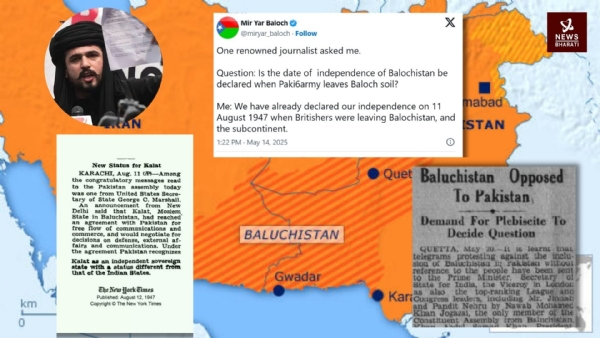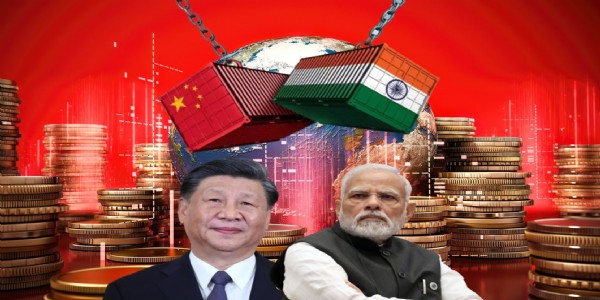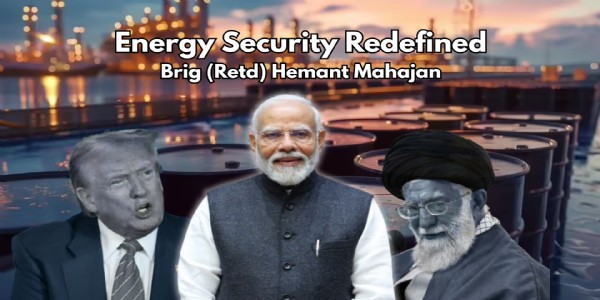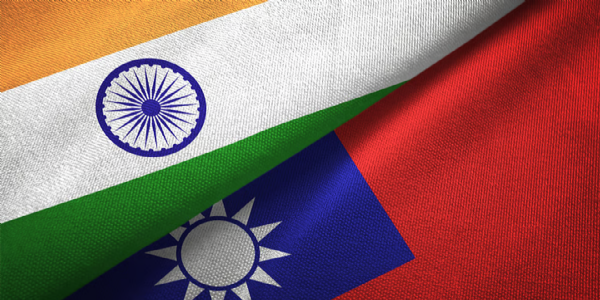Balochistan’s Struggle and India’s Moral Crossroads
A staggering 36% of Pakistan’s gas comes from Balochistan but its own people often suffer from fuel shortages and infrastructural neglect.
Total Views | 151
On August 11, 1947, in the final days of British colonial rule in South Asia, Mir Ahmad Yar Khan, the Khan of Kalat, declared the independence of Balochistan. This moment, brief yet historically potent, signified a sovereign assertion from a region whose identity predates even British involvement. However, what began as a spark of autonomy soon faded under the growing shadow of Pakistan’s centralizing ambitions.

Balochistan’s story is unlike that of other princely states. Comprising the British-administered Balochistan province and the semi-autonomous Kalat State, the region had a distinct administrative and legal history. In 1876, the British signed a treaty with Kalat that acknowledged its internal autonomy. So when Pakistan emerged in 1947, the Khan of Kalat asserted his right to remain independent, a stance initially accepted by both the British and even Pakistan's founder, Mohammad Ali Jinnah.
But by March 1948, diplomatic overtures had turned into coercive politics. Under immense pressure, both political and military, Kalat was forced to accede to Pakistan. This annexation was done without the consent of the Baloch parliament (Dar-ul-Umra) and met with immediate resistance. Armed rebellions erupted, sowing the seeds of a decades-long struggle for autonomy and self-determination.
So why is Balochistan so significant to Pakistan, and why has it remained in the grip of harsh suppression?
Paradox of Balochistan in Pakistan’s Power Game
Geopolitically, Balochistan comprises nearly 44% of Pakistan’s landmass and borders Iran, Afghanistan, and the Arabian Sea. Its strategic importance is heightened by the presence of Gwadar Port, a linchpin in the China-Pakistan Economic Corridor (CPEC). The region is also rich in natural resources like natural gas, gold, copper, and coal yet remains one of the most underdeveloped in Pakistan. A staggering 36% of Pakistan’s gas comes from Balochistan, but its own people often suffer from fuel shortages and infrastructural neglect.
This disparity has not gone unnoticed. Islamabad’s policies in the region have revolved around resource extraction and militarized control rather than inclusive development. Reports of enforced disappearances, torture, and extrajudicial killings abound. In the eyes of many Baloch, Pakistan values the land more than its people.
Amid this ongoing strife, Baloch sentiment increasingly looks eastward. India, despite its own complex regional challenges, is often seen as a model for democratic inclusion and federal representation. The abrogation of Article 370 and subsequent focus on developmental integration in Jammu & Kashmir has intrigued many Baloch activists. Where Pakistan rules by force, India seeks unity through constitutionalism.
India’s moral compass was briefly aligned with Baloch aspirations in 2016, when Prime Minister Narendra Modi referred to Balochistan from the ramparts of the Red Fort. For many Baloch nationalists, this acknowledgment was more than symbolic. It was viewed as a validation of their long-ignored struggle. Numerous Baloch demonstrations since then have seen Indian flags hoisted in solidarity, a hopeful gesture.
Shared Roots, Scattered Destinies
The cultural and historical ties between India and Balochistan run deep. The ancient site of Mehrgarh in Balochistan is considered one of the earliest cradles of the Indus Valley Civilization. In the 18th century, Maratha expeditions extended into areas bordering Balochistan, and even today, descendants of Baloch families reside in parts of Maharashtra.
As an observer of defence and geopolitics, it is imperative to recognize that the Baloch issue is not merely a separatist movement but it is a people’s call for dignity. In contrast to Kashmir, where India has doubled down on state-led development and democratic outreach, Pakistan continues to treat Balochistan as a restive colony rather than a federal partner.
After the British left in 1947, princely states were given the choice to accede to India, Pakistan, or remain independent. Maharaja Hari Singh of Jammu & Kashmir signed the Instrument of Accession to India on October 26, 1947 and secured the fate of Kashmir. After the abrogation of Article 370 in 2019, India has pursued a policy of constitutional integration, infrastructural investment, and democratic engagement in the region
India, with its growing clout on global platforms, now faces a moral and strategic question: Should it voice stronger support for the Baloch cause, not as an act of interference, but as an assertion of universal democratic values?
The fire in Balochistan has never truly died. It simmers in the hearts of those who believe that history was unjustly overwritten. And perhaps, the time has come for that history to be rewritten, with justice, voice, and vision.
--
Bharati Web







